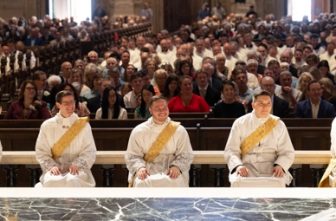In a representative democracy, citizens vote to determine who will represent them, their families and their neighbors at all levels of government.
When voting for a candidate, citizens trust that the elected official will consider his or her conscience and do what is in the best interest of the constituents.
“When I was elected, I decided that three things should guide my vote, the three C’s: conscience, constituents and caucus. In that order,” said Minnesota State Rep. Dean Urdahl during his retirement speech on the House floor in May. “In too many cases, we now only have one C, the caucus, and it’s on both sides.”
Historically, legislators have prioritized and balanced those three guiding principles when casting their votes: conscience, constituents and caucus.
However, as we reflect on Urdahl’s words, we must confront a significant shift in our historic legislative process. Because in recent times, it appears that many decisions are made — not with conscience or constituents in mind — but based solely on caucus affiliation. Prioritizing caucus alone usually means promoting the policy agenda of a chosen few, appeasing the wishes of financial donors, and winning-at-all-costs to retain power. All at the risk of constituents and consciences.
This shift is evident on contentious issues that involve human dignity, for which votes often fall strictly along party lines. In recent legislative sessions, we saw this in committee hearings and on floor votes with issues like physician-assisted suicide, gender ideology and immigration. Legislation frequently does not even reach the floor of the full body unless the majority caucus is confident that it has the votes of their caucus members to pass it. Members who may personally disagree with the caucus position often stay quiet, opting to align with their party rather than voice dissent and risk political blowback.
In his 1956 book, “Profiles in Courage,” the late President John F. Kennedy described acts of integrity by senators who defied the wishes of their party to do what their conscience felt was right.
This concept is at the core of what we believe as Catholics. Practicing faithful citizenship is not about party affiliation, ideology or societal pressures. It is about focusing on what protects or threatens the dignity of every human life.
In Forming Consciences for Faithful Citizenship, the U.S. Conference of Catholic Bishops (USCCB) states that “Catholic teaching challenges voters and candidates, citizens and elected officials to consider the moral and ethical dimensions of public policy issues.”
This is what drives our work at the Minnesota Catholic Conference. As staff, we work to educate and engage policymakers on the moral and ethical angles of legislation in the hopes that it resonates with the legislators’ consciences.
Constituents play a key role in helping form the consciences of legislators, too. They also can inform caucus priorities to reflect more virtuous aspirations than pure political gamesmanship. This is why Catholic citizens need to be involved in the whole process.
The first step is to do more than vote. Voting is incredibly important for our political process, and Catholics should continue to do so. However, to combat the forces that created an environment where caucus priorities overshadow conscience and constituent needs, further action is required.
Beyond the ballot box, Catholics should engage with legislators and candidates running for office. Meet them at the Capitol and in the district. Personal interactions remind them of their duty to their constituents and the importance of voting their conscience.
Mobilize your family, friends and fellow parishioners to join you in advocacy. A collective voice is more powerful and harder to ignore. On the MCC website at mncatholic.org you can watch Advocacy 101: How to make your voice heard at the Capitol.
WATCH: Advocacy 101 – How to make your voice heard at the Capitol.
The effort can be aided by joining the Catholic Advocacy Network (CAN). This network provides regular opportunities to engage, learn and act on issues that matter to our faith.
While the shift toward caucus-dominated decision-making is concerning, it is not irreversible. By actively participating, we can encourage our legislators to return to a balance of conscience, constituents and caucus.
“Inside the Capitol” is a legislative update from Minnesota Catholic Conference staff.




